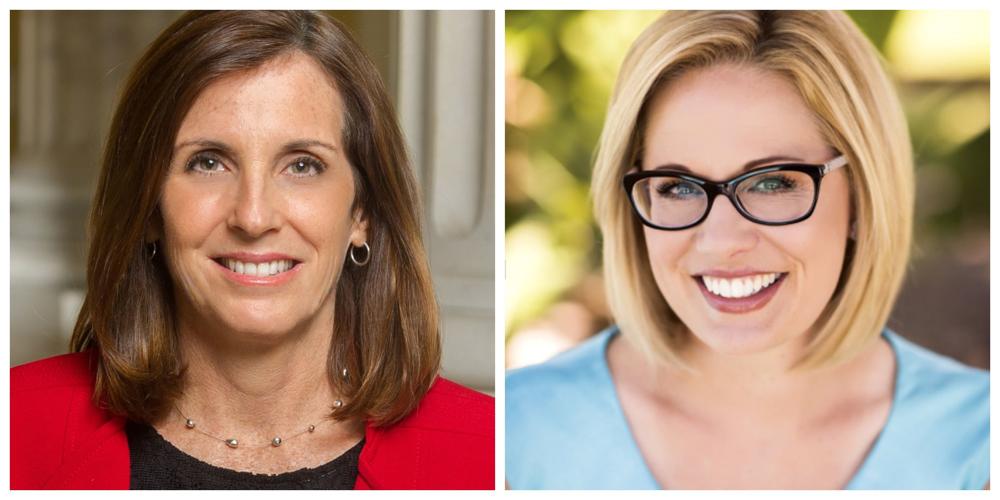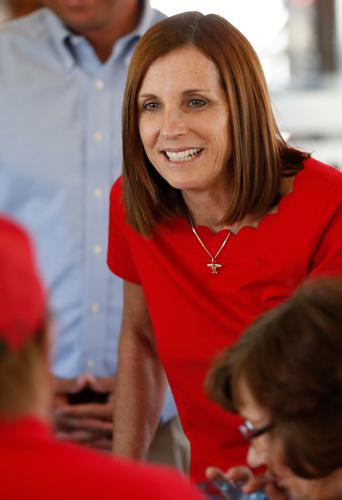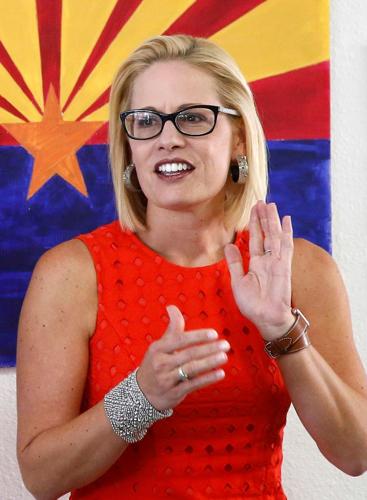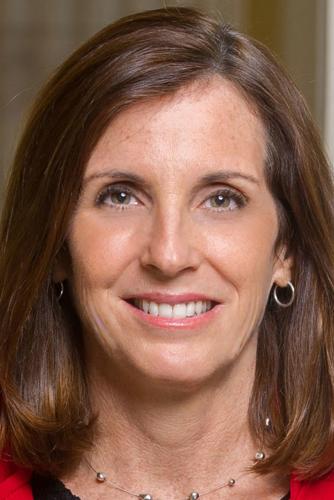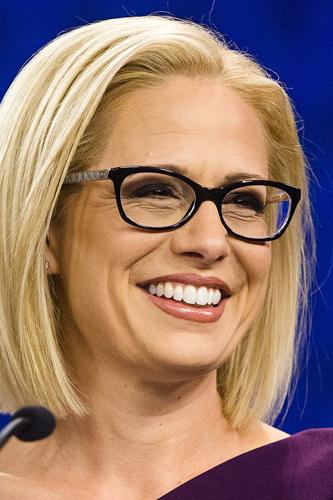PHOENIX — Arizona’s costly and contentious Senate race remained a nail-biter late Tuesday night as the contest between Republican Rep. Martha McSally and Democratic Rep. Kyrsten Sinema was too close to call.
Hundreds of thousands of ballots were still uncounted as the two congresswomen were separated by only a few thousand votes. Election officials in Maricopa County, the state’s largest, have warned that many votes may not start to be counted until Thursday.
The deadlock came amid heavy statewide turnout of about 60 percent, more in line with a presidential election than a midterm. The Senate contest was the marquee race in an election where Republicans appeared poised to sweep most, if not all, other statewide seats.
Democrats hope Sinema can reverse a decade-long losing streak in all Arizona statewide races. She and McSally are champion fundraisers and skilled politicians who have repeatedly won in tough swing districts. Both candidates said nothing publicly Tuesday night as the ballots were slowly counted.
The avid triathletes are battling over the seat vacated by Sen. Jeff Flake, a Republican who decided not to run for re-election because he realized his criticism of President Trump made it impossible for him to keep the seat.
McSally and Sinema spent Election Day trying to drum up every vote possible during last-minute stops at local restaurants.
McSally met with supporters at a diner in the Phoenix suburb of Chandler, urging them to “carbo-load” and get back to knocking on doors to get out the vote.
“We’re mission complete, we’re almost out of ammo, just land the plane,” said McSally, a former fighter pilot.
Sinema stopped to mingle with the owners of a Phoenix taco shop and their customers before heading to a voting site at a downtown library.
The Democrat said she would remain “laser-focused” until polls closed.
“My job has always been to do a good job and to try to earn the support of all Arizona voters, regardless of political party,” Sinema said. “We’re going to continue doing that until 7 p.m. tonight.”
McSally and Sinema have both remade themselves politically.
McSally, 52, is a one-time Trump critic who has embraced the president since his election.
She has tried to rally Republican voters by emphasizing her military background as the first U.S. female combat pilot while touting her support for the president’s tax cuts and other parts of his agenda.
Sinema, 42, is a former Green Party activist who became a Democratic centrist with her first election to the House of Representatives in 2012.
She’s one of the congressional Democrats most likely to vote to back Trump’s agenda but has spent the race hammering McSally for casting a vote for the health bill backed by the president.
The repeal of the Affordable Care Act, which didn’t become law, would have weakened protections for people with pre-existing medical conditions.
In response, McSally criticized Sinema over her shifting views, contending she was still a closet liberal who disrespected the military.
Republican ads publicized a 2010 video of Sinema repeating a comedian’s description of Arizona as “the meth lab of democracy.”
McSally also accused Sinema of treason for an offhand comment in a 2002 radio interview with an anti-war talk-show host who suggested hypothetically he might join the Taliban. Sinema had responded it would not bother her if she did so.
During her 2016 campaign to be re-elected to her Tucson-area swing district House seat, McSally criticized Trump for attacking the parents of an Army captain killed in Iraq and for a videotape in which the future president bragged about sexually assaulting women.
Though she has since embraced the president, her earlier criticism hobbled her during this year’s three-way Republican primary for Senate, when challengers attacked her as insufficiently supportive of the president.
Sinema faced no real opposition in the Democratic primary and had months to define herself as a nonpartisan, problem-solving centrist on the airwaves while her allies slammed McSally with attack ads over the Republican’s health-care vote.
The candidates and their allies spent more than $90 million in a race that could determine which party controls the U.S. Senate. Also at stake is Arizona’s role in national elections.
Republicans have won every statewide race since 2006. But Democrats have repeatedly hoped the state’s growing Latino population and influx of more educated professionals would make it competitive.
The Senate race will test that theory and may help determine whether Democrats target Arizona in the 2020 presidential election.
Photos: 2018 General Election in Tucson and Arizona
2018 Election in Arizona
Updated
Nikki Lee records as Congressional District 2 winnerAnn Kirkpatrick speaks during the Pima County Democratic Party Election Night watch party at the DoubleTree by Hilton Hotel Tucson, 445 S. Alvernon Way, Nov. 6, 2018, in Tucson, Ariz.
2018 Election in Arizona
Updated
Ellie Jerauld, right, looks over at her cousin, Anita Leist, and cheer as Fox News annouces that Republicans will retain control of the U.S. Senate during a Republican Election Night party at the Sheraton Hotel, 5151 E. Grant Road, on November 6, 2018.
Election 2018 Governor Ducey Arizona
Updated
Republican Arizona Gov. Doug Ducey, R, embraces Cindy McCain, wife of the late U.S. Sen. John McCain, while speaking to supporters, Tuesday, Nov. 6, 2018, at an election night party in Scottsdale, Ariz. Incumbent Ducey defeated Democratic challenger David Garcia for his second term.
2018 Election in Arizona
Updated
David Garcia, right, Democratic candidate for Arizona governor, gives his concession speech as his wife, Lori, left, listens at an election-night gathering Tuesday, Nov. 6, 2018, in Phoenix. Garcia lost to Republican Gov. Doug Ducey. (AP Photo/Ross D. Franklin)
2018 Elections Arizona
Updated
Congressman Raul Grijalva speaks during the Pima County Democratic Party Election Night watch party at the DoubleTree by Hilton Hotel Tucson, 445 S. Alvernon Way, Nov. 6, 2018, in Tucson, Ariz.
2018 Election in Arizona
Updated
Tucson Unified School District candidate Adelita Grijalva, right, talks with Pima County Democratic Party chair Jo Holt during the Pima County Democratic Party Election Night watch party at the DoubleTree by Hilton Hotel Tucson, 445 S. Alvernon Way, Nov. 6, 2018, in Tucson, Ariz.
2018 Election in Arizona
Updated
Arizona House of Representatives Legislative District 10 candidate Kirsten Engel, left, speaks as Legislative District 10 candidate Domingo DeGrazia looks on during the Pima County Democratic Party Election Night watch party at the DoubleTree by Hilton Hotel Tucson, 445 S. Alvernon Way, Nov. 6, 2018, in Tucson, Ariz.
2018 Election in Arizona
Updated
Shelly Schwartz and her fellow democrats cheer as favorable results roll in during the Pima County Democratic Party Election Night watch party at the DoubleTree by Hilton Hotel Tucson, 445 S. Alvernon Way, Nov. 6, 2018, in Tucson, Ariz.
2018 Election in Arizona
Updated
Arizona House of Representatives Legislative District 10 candidate Domingo DeGrazia, right, talks with Arizona House of Representatives Legislative District 10 candidate Kirsten Engel, left, and State Senate District 10 candidate David Bradley during the Pima County Democratic Party Election Night watch party at the DoubleTree by Hilton Hotel Tucson, 445 S. Alvernon Way, Nov. 6, 2018, in Tucson, Ariz.
2018 Elections Arizona Kirkpatrick
Updated
Democrat Ann Kirkpatrick, candidate for Congressional District 2, gives a victory speech during the Pima County Democratic Party Election Night watch party at the DoubleTree by Hilton Hotel Tucson, 445 S. Alvernon Way, Nov. 6, 2018, in Tucson, Ariz.
Election Night
Updated
Lea Marquez Peterson, right, leaves the stage with her daughter, Emma Peterson, after making a short concession speech during a Republican Election Night party at the Sheraton Hotel, 5151 E. Grant Road, on November 6, 2018.
2018 Election in Arizona
Updated
Pima County Elections employees count early ballots at the Pima County Elections Office, 550 S. Country Club Road, on Election Day, Nov. 6, 2018, in Tucson, Ariz. Polls are open until 7 p.m.
2018 Elections Arizona
Updated
Democrats holler and cheer after network news channels declared they had taken control of the House of Representatives during the Pima County Democratic Party Election Night watch party at the DoubleTree by Hilton Hotel Tucson, 445 S. Alvernon Way, Nov. 6, 2018, in Tucson, Ariz.
Election Night
Updated
Susie Hiestand pays attention to election results coming in during a Republican Election Night party at the Sheraton Hotel, 5151 E. Grant Road, on November 6, 2018.
2018 Election in Arizona
Updated
An elections official counts ballots at the Tabulation and Election Center, Tuesday, Nov. 6, 2018, in Phoenix. (AP Photo/Matt York)
2018 Election in Arizona
Updated
Voters wait in line to cast their ballots at a relocated polling station, Tuesday, Nov. 6, 2018 in Chandler, Ariz. The new polling station opened four hours late after the original location did not open due to the buildings' foreclosure overnight. (AP Photo/Rick Scuteri)
2018 Election in Arizona
Updated
Arizona Gov. Doug Ducey, R, arrives to cast his ballot early Tuesday, Nov 6, 2018 in Paradise Valley, Ariz. Ducey is seeking re-election against Democratic challenger David Garcia. (AP Photo/Rick Scuteri)
2018 Election in Arizona
Updated
U.S. Senate candidate Kyrsten Sinema, D-Ariz., speaks to supporters at the Barton Barr Central Library, Tuesday, Nov. 6, 2018 in Phoenix. Sinema and Republican challenger Martha McSally are seeking the senate seat being vacated by Jeff Flake, R-Ariz., who is retiring in January.(AP Photo/Rick Scuteri)
2018 Election in Arizona
Updated
Arizona Republican senatorial candidate Martha McSally, speaks with voters, Tuesday, Nov. 6, 2018, at Chase's diner in Chandler, Ariz. McSally and Democratic challenger Kirsten Sinema are seeking the senate seat being vacated by Jeff Flake, R-Ariz., who is retiring in January. (AP Photo/Matt York)
2018 Election in Arizona
Updated
Todd Clodfelter, candidate for legislative district 10, talks with a supporter during a Republican Election Night party at the Sheraton Hotel, 5151 E. Grant Road, on November 6, 2018.
2018 Election in Arizona
Updated
Nick Pierson, candidate for congressional district 3, left, talks to supporters with his wife, Marolyn, right, during a Republican Election Night party at the Sheraton Hotel, 5151 E. Grant Road, on November 6, 2018.
2018 Election in Arizona
Updated
A cutout of Donald Trump leads the way to the Republican Election Night party at the Sheraton Hotel, 5151 E. Grant Road, on November 6, 2018.
2018 Election in Arizona
Updated
Karen Schutte is in a festive mood during a Republican Election Night party at the Sheraton Hotel, 5151 E. Grant Road, on November 6, 2018.
2018 Election in Arizona
Updated
Tony Pettway, center, pays close attention to the television as results are announced during a Republican Election Night party at the Sheraton Hotel, 5151 E. Grant Road, on November 6, 2018.
2018 Election in Arizona
Updated
Ellie Jerauld, right, looks over at her cousin, Anita Leist, and cheer as Fox News annouces that Republicans will retain control of the U.S. Senate during a Republican Election Night party at the Sheraton Hotel, 5151 E. Grant Road, on November 6, 2018.
2018 Election in Arizona
Updated
Supporters gather to watch results during a Republican Election Night party at the Sheraton Hotel, 5151 E. Grant Road, on November 6, 2018.
2018 Election in Arizona
Updated
Democrat supporters cheer as they watch national election results at an election night gathering Tuesday, Nov. 6, 2018, in Phoenix. (AP Photo/Ross D. Franklin)
2018 Election in Arizona
Updated
Rep.-elect Greg Stanton, D-Ariz., celebrates his win at an election night gathering for Democrats Tuesday, Nov. 6, 2018, in Phoenix. Stanton defeated Republican Steve Ferrara in Arizona's 9th Congressional District. (AP Photo/Ross D. Franklin)
Election Night
Updated
Supporters gather to watch results during a Republican Election Night party at the Sheraton Hotel, 5151 E. Grant Road, on November 6, 2018.


